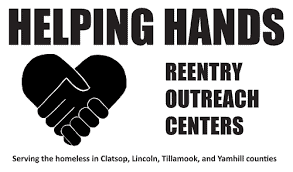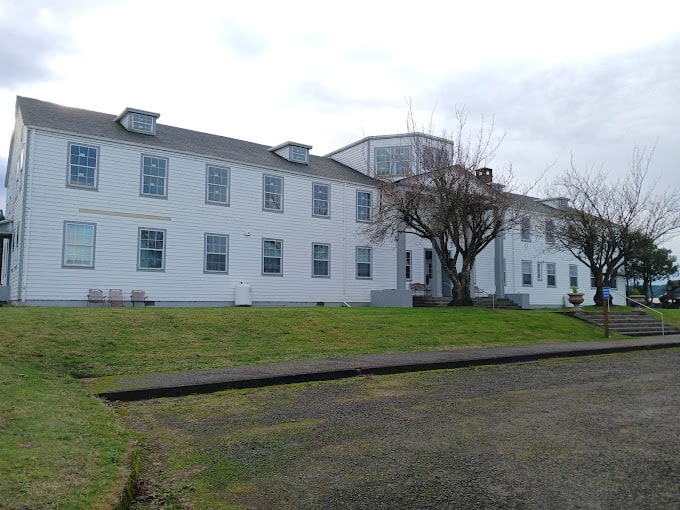By Jim Heffernan
I’ve been thinking about the homeless, in our county and, it seems, everywhere else in our rich country. We hear a lot about it and the preferred answer seems to be, just keep it out of my neighborhood. They’re all druggies and crazies, send them away, anywhere but here.
It was very refreshing for me to learn that somebody, right here in Tillamook County, is doing something about it. It took me riding a bus to learn about it.
The first bus I got on when I started my bus riding project was the #6 “Port” bus. It runs three times a day from the Transit Center downtown to the Port of Tillamook Bay by way of Gienger Road and back.
That’s how I found out about the Helping Hands Re-entry Center at the Port. It’s in a large wooden building that was originally the Headquarters Building when the Port was a WWII blimp base. Right now, it provides a safe haven for 40 people who need it and work is progressing on the second floor to make room for another 40. Helping Hands purchased the building from the Port for $350K and now runs and maintains it, largely with volunteers.
A bright-eyed woman I rode with on another bus told me about living at the Helping Hands Center. She had lived on the streets and in her car before Helping Hands and I think it was her sense of relief that put the light in her eyes.
I wanted to learn more and ended up having a phone conversation with Alan Evans, the founder of Helping Hands. It was a very pleasant conversation and I learned a lot about him and the Helping Hand Re-entry Centers.
Helping Hands runs 10 other centers in four other countries, Multnomah, Clatsop, Lincoln, and Yamhill. Altogether, they shelter more than 500 people every night.
But Helping Hands provides much more than basic shelter. They are dedicated to the principle of putting the best person they can back into the community. They want to do more than just provide a warm and dry place for the night. Like their name, they want to offer a “helping hand” so that people can have a sustainable life. They take the time to learn each person’s story and connect them to needed local resources and services. They do whatever they can to assist with their recovery. The end goal is to enable the person to re-enter the community and have a life that is productive and sustainable. As Alan says, “We want to put the best person we can back into the community.”
Alan’s personal story is amazing. Because of an abusive home, he went into foster care at 11 and ended up running away at 13. He spent 25 years being homeless and for much of that time, addicted to Meth. In 2002 he started an 8-bed shelter in Seaside, OR with $40 start-up cash. Twenty-one years later there were 11 reentry centers and 500+ beds.
Their latest and biggest project is the Bybee Lakes Hope Center (BLHC). It has transformed the never-occupied 155,400 sq. ft. Wapato Correctional Facility into a transitional housing facility for the Portland Metro community. It was originally built in 2002 at a cost of $58 million by Multnomah County. It sat empty and unused for 18 years.
Jordan Schnitzer bought it in 2020 for $6 million, with the dream of converting it into housing for the homeless. He first approached Multnomah County and was told nothing could be done. Then he met up with Alan Evans and things started to happen.
Some money for the project came from the state and county, but the bulk came from private philanthropy and the United Way of the Columbia-Willamette. It impresses me that although Helping Hands does provide 30 days of low-barrier emergency shelter, its prime mission is to provide “transitional” housing so that homeless people can resume satisfying lives away from the streets. People in transitional housing are required to pay $250 a month and to remain clean and sober. They can stay as long as it takes to make a successful reentry.
One thing Alan told me sticks in my head, “Every person living on the street is someone’s father, mother, brother, or sister, and they all have their own story. Now I get to focus on making sure those stories are heard so that the people who are making decisions about how to spend millions upon millions of dollars, understand what the need is.”
My simple answer to homelessness is to somehow have about another 1 or 2 million people like Alan Evans scattered across this nation. They’d get the job done. We are lucky to have Alan and Helping Hands in Tillamook County.
 For more about Helping Hands, go to www.helpinghandsreentry.org
For more about Helping Hands, go to www.helpinghandsreentry.org
For more about Helping Hands, here’s a recent Pioneering Podcast with Alan Evans:


